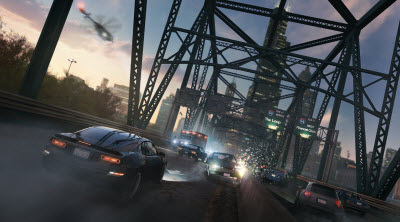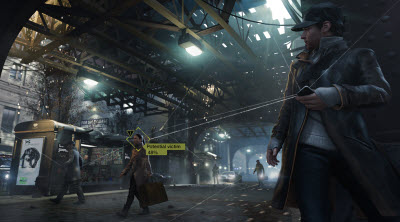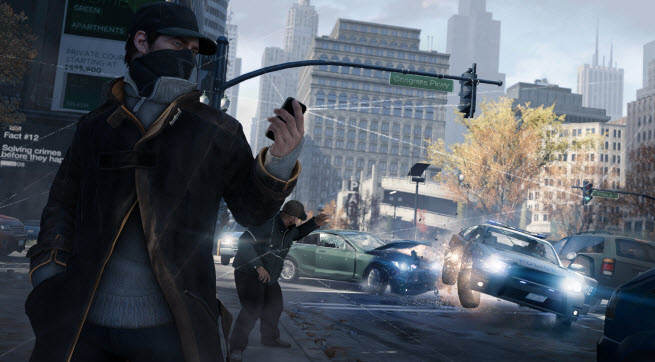The premise behind Ubisoft’s upcoming Watch Dogs game is scary because it’s not so far from the truth. A computer hacker could break into a city’s central nervous system and cause all sorts of vigilante havoc. And the more connected cities become, the easier it will be to take them over and control them.
Dominic Guay, senior producer on the game, said in a preview this week in San Francisco that the team started out with a mandate of creating a new brand that could resonate with modern gamers. The team chose the code name Nexus, the central point of an interconnected network, to reflect their focus on the idea of ubiquitous connectivity. They pulled that idea from the things that they saw around them. And they saw that it could be vulnerable.
That’s where Guay, who could pass for a great salesman at IBM, starts veering off the sales pitch for better technologies and the wonderful visions of the future that tech companies are trying to sell city governments on. If the security gets hacked, you have a world of trouble.
 “There’s a guy on our team whose father works for a big city in Canada,” Guay said. “They’ve implemented a system so that water distribution in the city can be monitored from smartphones. They can close down valves and stuff like that. He told me that at some point they got worried because they realized that most of the employees were using simple passwords: ‘1111’ or ‘2222.’ Any 13-year-old could have accessed it and stopped the water supply to two million people.”
“There’s a guy on our team whose father works for a big city in Canada,” Guay said. “They’ve implemented a system so that water distribution in the city can be monitored from smartphones. They can close down valves and stuff like that. He told me that at some point they got worried because they realized that most of the employees were using simple passwords: ‘1111’ or ‘2222.’ Any 13-year-old could have accessed it and stopped the water supply to two million people.”
During the 4.5 year it has taken to build the game — which comes out Nov. 19 — reality is catching up with the fiction. IBM has a major initiative to build “smarter cities” using a complete overhaul of the technology for running the cities through the IBM Intelligent Operations Center — just the sort of thing that Watch Dogs’ main character Pearce loves hacking.
Pearce is a masked man with a scarf. That scarf has a logo on it: a symbol for connectivity.
“The core influence that brought us to technology came from looking at our own lives,” Guay said. “More and more, we were using computers and smartphones. Technology has always impacted our daily lives, but in the past 20 years, it has accelerated tremendously. We saw we were moving from smartphones to smart cities.”
 Indeed, modern cities in Asia, the Middle East, and even Europe have futuristic control systems for monitoring transportation, surveillance, subways, traffic lights, and electrical grids. In existing cities, those technologies are coming in a step at a time, Guay said. In Watch Dogs, the team focused on a smarter version of Chicago. In the real world, so-called smart cities include Amsterdam, Cairo, Dubai, Edinburgh, Lyon, Malaga, Kochi in India, and Stratford in Canada.
Indeed, modern cities in Asia, the Middle East, and even Europe have futuristic control systems for monitoring transportation, surveillance, subways, traffic lights, and electrical grids. In existing cities, those technologies are coming in a step at a time, Guay said. In Watch Dogs, the team focused on a smarter version of Chicago. In the real world, so-called smart cities include Amsterdam, Cairo, Dubai, Edinburgh, Lyon, Malaga, Kochi in India, and Stratford in Canada.
“It’s natural that we try to make those cities run as efficient as they can,” Guay said.
But accidents can happen. In the great Northeast Blackout of 2003, 11 people died in the dark. Fifty million people lost power over two days and the cost was an estimated $6 billion. That problem could very well have been caused by terrorists or a disgruntled employee who unleashed a computer virus in the grid and shut it down. At the time, the fear of hackers was very real, with suspicion falling on the Chinese army.
Since then, modern systems have advanced. Data centers are in place, collecting huge amounts of information on people through their computers, smartphones, and entertainment systems. Ubisoft’s marketing material for the game notes that we all carry a 2.8-gigabyte digital shadow, consisting of all of our records kept in data centers.
That “big data” can be analyzed and used by major corporations to sell consumers all sorts of things. But the big “what if” in the game focuses on what would happen if that data could be used to figure out what you think and what you believe. Could that information be turned against you, to influence your world views?

In the game, the smart city’s own ctOS (City Operating System) can take control of everything in the city and connect it with the big data analysis of all of the citizens. If a criminal is stalking somewhere, the police can identify the person through the centralized database and calculate the odds of a crime occurring. Such crime prediction systems are being implemented in many major cities, Guay said, in another tip of the hat to the plot of Minority Report, the Tom Cruise film where police try to stop crimes before they happen.
The police can then be allocated to the right spots to prevent crimes. Watch Dogs warns us that, “the next assault will do more than just turn out the lights.”
Kevin Short, the lead story designer for Watch Dogs, said that the character Pearce is sucked into an addiction. A man who has made questionable choices, he hacks the system and gets inside the heads of the people around him. He uses the access to the network to protect those close to him. He uses a universal electronic key to steal any vehicle. He preys on people using free WiFi, and literally steals money from people he passes by hacking into their phones and siphoning funds from their bank accounts.
“The problem is, if you start spying on people in every aspect of their lives, it becomes addictive,” Short said. “What if you see a woman being mugged in a back alley or a man being extorted? It becomes hard to do nothing.”
Almost by accident, Pearce becomes a vigilante hero. The police don’t like that, and they try to use the city operating system to hunt him down. They become very powerful in their ability to track suspects quickly and corner them. When shots are fired, they can triangulate on the sound to find the location, much like the real-world ShotSpotter does. But the digital vigilante can use the system against them. Beyond the police, there will be a corrupt organization that Pearce has to fight against in the game. Ubisoft isn’t spilling the beans on that part of the plot yet.
Just like in the game, you’ll be able to use a smartphone companion app to play Watch Dogs. You can also make contact with other players through a multiplayer mode, which hasn’t been fully described yet. That gives you the weird feeling of mixing fiction and realism. Perhaps the only really unrealistic part of the demo that I saw was that Pearce’s smartphone never ran out of batteries.
Does it sound far-fetched to you? Well, consider the fact that the following companies use the term “smart city” in their marketing: Schneider Electric, Thales Group, IBM, Oracle, Siemens, Living Planit, and Invensys Operations Management. The topic is under study at universities such as MIT and it is the subject of conferences such as Smart Cities Future. The city of London is famously monitored by millions of surveillance cameras. And the subject of hacking smart cities comes up regularly at security conferences.
VentureBeat's mission is to be a digital town square for technical decision-makers to gain knowledge about transformative enterprise technology and transact. Learn More

